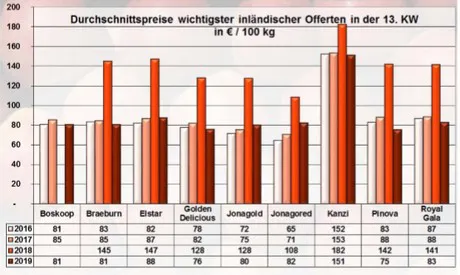The market was dominated by German apples, especially Elstar, Jonagold and Boskoop. Granny Smith and Golden Delicious were mainly coming in from Italy. France mainly sent over Granny Smiths and Pink Ladies. Here and there Dutch and Belgian products became more prominent, but more often these only had a complementary character. Over time, several Polish shipments arrived in Berlin, where they were marketed at a very reasonable price of € 0.65 per kg.

From overseas the first Gala appeared; the South African fruits however generated very little interest in Munich. The Chilean Royal Gala further expanded its presence in Hamburg, but they often went directly to retail markets. Overall, the trade was steady and without any special highlights. The quality of the European batches was quite satisfactory overall. There were not many cases where there were quality issues. This meant that distributors hardly saw any reason to change their prices as compared to week 12. From time to time, local Rubinettes and Wellants became more expensive. As a result of too abundant product availability and concordant stocks, in Munich some varieties were cheaper.
Pears
South Africa dominated the markets as far as pears were concerned. The prices often remained at the levels of last week, as supply was sufficiently in step with market sales.
Table grapes
The markets were well stocked with the prevailing South African and complementary Chilean and Indian shipments. Shipments from Brazil and Namibia arrived only in dribs and drabs.
Oranges
Though there were still abundant amounts available, there was certainly some saturation of the market, as demand was very limited during this period.
Lemons
Spanish Primofioris dominated the scene. This week saw a trade without any real highlights. Supply and demand were very much balanced for lemons.
Bananas
Locally, we saw a steady decrease in stocks due to high availability. In many other places, local demand was really in line with supply so that prices remained at their previous level without much else.
Cauliflower
French and Italian deliveries were predominant. The cooler weather had an effect on the sales from time to time. The prices, however, did not tend to go up in general.
Lettuce
Iceberg lettuce came in exclusively from Spain. Locally, supply might be limited. Some of the produce was ploughed under in the cultivation areas and retail seemed to sometimes further impair sales with promotions.
Cucumbers
While the importance of the Dutch, Belgian, domestic and Greek batches intensified, that of the Spanish goods decreased. Demand could be met without much effort.
Tomatoes
Through produce from the Netherlands, Spain, Belgium and Italy, European growers were still represented quite well on the market. Supply generally grew and it would eventually exceed demand. As a result, distributors could not avoid dropping their prices slightly.
Sweet peppers
The presence of the Dutch and Belgian batches expanded further. Meanwhile, the importance of Spanish goods was noticeably limited.
Asparagus
The market places were sufficiently supplied with asparagus from German and Greek soils. Although the season was still only getting started, there were still some good quantities accessible.
